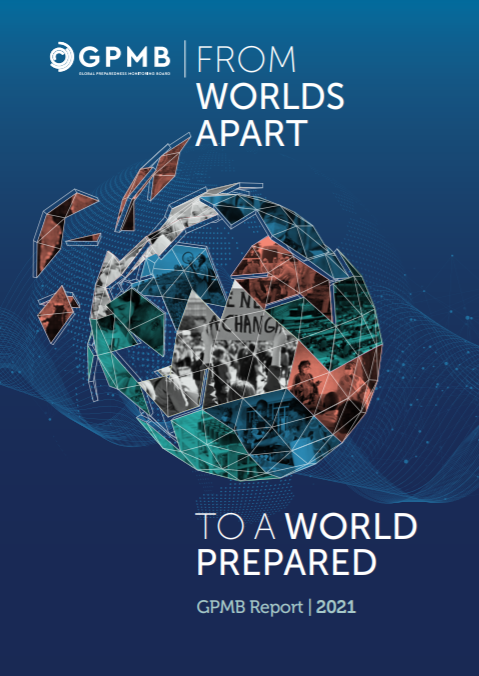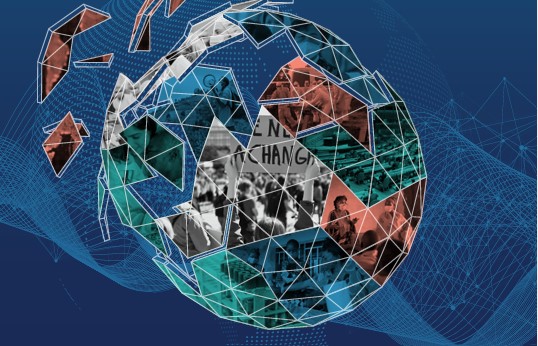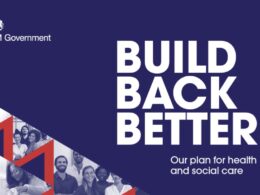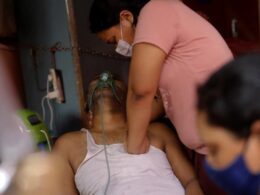BMJ
Ingrid Torjesen
(Published 27 October 2021)Cite this as: BMJ 2021;375:n2610
BMJ 2021; 375 doi: https://doi.org/10.1136/bmj.n2610
Time is running out for world leaders to act to end the current covid-19 pandemic and to introduce measures to prevent future pandemics, the Global Preparedness Monitoring Board (GPMB) has said.
In its 2021 report the board issued a stark warning that the “window of opportunity to make meaningful change” was closing quickly as the world’s attention turned to other issues.
The report, launched at the World Health Summit in Berlin on 26 October, 1 urges leaders to take political responsibility for the widespread transformation needed in the health emergency ecosystem and to act immediately-before the end of this year-to demonstrate their commitment and intent.
Hundreds of recommendations have been made over the past two decades to reform the global response to health emergencies, the GPMB said, but they were not acted on. Even in the past year meetings of the UN General Assembly, the UN Security Council, the World Health Assembly, G7 leaders, and G20 leaders have achieved little more than declarations of intent.
Elhadj As Sy, co-chair of the board, wrote, “It is easy to be cynical and think that nothing can change, that inequality, inaction, and division are unavoidable, that the models of the past cannot be exchanged for better ways of working together that benefit all, that we are forever condemned to repeat this cycle of panic and neglect.
“But we must reject pessimism, recognize our common humanity and growing interdependence, and create a global health ecosystem that serves everyone. Together we must move from worlds apart to a world prepared.”
Critical actions
The report identifies six critical actions needed for a safer world. These include
- strengthening global governance through an international agreement on health emergency preparedness and response,
- with sustainable and flexible financing,
- while building a stronger World Health Organization and
- creating an agile and equitable health emergency system.
These actions must be underpinned by empowering communities, engaging civil society and the private sector, and strengthening independent monitoring and mutual accountability, it says.
The GPMB said that action should begin with WHO member states
- Agreeing at the World Health Assembly next month on the need to adopt an international agreement and establish a process for taking that forward.
- This should be followed before the end of the year by the UN General Assembly agreeing to convene a summit of heads of state and government, it advised, and the WHO Working Group on Sustainable Financing agreeing a significant increase in the WHO assessed contributions, as recommended by the UK’s Foreign Affairs Committee last month. 2
- An additional financial intermediary fund should be set up within the World Bank to provide additional funding for international preparedness and response, the report says, through a formula based on equity and countries’ ability to pay, supplemented by the private sector.
- Finally, by the end of the year WHO member states should develop terms of reference for research, development, and equitable access to common goods, learning lessons from the inequity of access to vaccines and other goods during the covid-19 pandemic. 3
WHO set a target of vaccinating at least 10% of the population in each country against covid-19 by the end of September 2021, a goal reached by almost 90% of high income countries but not a single low income country.
The report concludes that covid-19 has exposed a broken and divided world in which access to vaccines depends on ability to pay rather than need, where governments, leaders, and institutions are too unaccountable to their populations, and where societies are fragmented, nationalism is growing, and geopolitical tensions are rising.
References
See the original publication.
Originally published at https://www.bmj.com on October 27, 2021.
ORIGINAL PUBLICATION

Cite as:
Global Preparedness Monitoring Board. From worlds apart to a world prepared: GPMB 2021 report. 26 Oct 2021. https://www.gpmb.org/docs/librariesprovider17/default-document-library/gpmb-annual-report-2021.pdf?sfvrsn=44d10dfa_9
Executive Summary
Key messages
The COVID-19 pandemic has exposed a world that is unequal, divided, and unaccountable. The health emergency ecosystem reflects this broken world. It is not fit for purpose and needs major reform.
Hundreds of expert recommendations have been made over the last two decades, new structures have been created, but the level of ambition and action has failed to match the global need. We know what to do. We just cannot seem to do it.
… the level of ambition and action has failed to match the global need.
The current pandemic has made us more aware of the urgent need for fundamental change.
There is now momentum, but new governance and funding mechanisms are being discussed behind closed doors and in limited forums.
Effective transformation requires cohesive, coherent, and collaborative action.
We need a new global social contract to prevent and mitigate health emergencies. The new social contract must serve as the foundation of the global health emergency ecosystem. It should be based on the principles of equity, solidarity, inclusivity and reciprocity, accountability and transparency, sustainability and action.
To move from words to action, the Global Preparedness Monitoring Board (GPMB) calls for immediate action on the six most critical solutions for reform. They are:
- Strengthen global governance; adopt an international agreement on health emergency preparedness and response, and convene a Summit of Heads of State and Government, together with other stakeholders, on health emergency preparedness and response.
- Build a strong WHO with greater resources, authority, and accountability.
- Create an agile health emergency system that can deliver on equity through better information sharing and an end-to-end mechanism for research, development and equitable access to common goods.
- Establish a collective financing mechanism for preparedness to ensure more sustainable, predictable, flexible, and scalable financing.
- Empower communities and ensure engagement of civil society and the private sector.
- Strengthen independent monitoring and mutual accountability.
If the first year of the COVID-19 pandemic was defined by a collective failure to take preparedness seriously and act rapidly on the basis of science, the second has been marked by profound inequalities and a failure of leaders to understand our interconnectedness and act accordingly.
The world is more interdependent than ever. Our health emergency ecosystem must be too. Preparedness relies on a complex, dynamic ecosystem that spans across countries, sectors, and institutions. This system is broken, leaving the world acutely vulnerable to a range of health threats that is increasing at a greater pace than our capacity to prevent them.
It is in our power to fix this, but we must act now. In this report, the GPMB sets out an action plan, including six essential solutions to build a safer world. This will require bold, concerted, and collective action.
A Broken World
Fragmented by growing nationalism, geopolitical tensions, and deep inequalities, the world still struggles to mitigate the impact of COVID-19 almost two years on. COVID-19 has exposed a broken world that is inequitable, unaccountable, and divided.
Inequitable: The rift between the worlds of “the haves and the have-nots” is growing. Access to vaccines and treatments is determined by nationality and position in society, not by need or equity. Poor and marginalized countries and communities suffer the most from job losses, school closures, and supply chain failures. The pace of their recovery will be slower. Multilateral efforts to improve equity have fallen short of their goals. Global solidarity remains a mere catchphrase, with little meaningful action toward achieving it.
Unaccountable: In preparing for and responding to health emergencies, leaders make statements and commit to international agreements but do not follow through. Countries have failed to ensure that WHO has the adequate, predictable, and sustainable financing that would enable it to be strong and independent. The world lacks effective mechanisms to ensure accountability.
Divided: COVID-19 erupted into a polarized world characterized by heightened nationalism, distrust, and inequality. It has only accelerated those trends. Worse, while the key to containing the pandemic and preparing for the next is collective action, current processes to reform the health emergency ecosystem may simply perpetuate this fragmentation.
Toward a World Prepared
Unless we are able to counteract these destructive trends, our response to the next pandemic is unlikely to be much better. We have a brief window of opportunity before attention shifts to other issues. The GPMB calls for a renewed global social contract and action plan to help build a world prepared.
Global Social Contract
We need a global social contract for health emergencies that works collectively, across countries, sectors, and communities, based on the recognition of our shared world, shared risks, and shared responsibilities. This will require commitments and mutual accountability by all actors — countries, the multilateral system, civil society, the private sector, and individual citizens and community members. Health emergency preparedness and response must be based on this contract which promotes the principles of equity, solidarity, inclusivity and reciprocity, accountability and transparency, sustainability, and action.
Action Plan for a World Prepared
Many assessments have been done over the years, leading to hundreds of recommendations with similar conclusions. Rather than add to the list, the GPMB is prioritizing the following six solutions that will have the greatest impact in building a safer world.
- Strengthen global governance; adopt an international agreement on health emergency preparedness and response; and convene a Summit of Heads of State and Government, together with other stakeholders, on health emergency preparedness and response.
A strong and cohesive framework can provide direction, coordination, stewardship, and accountability, supported by sustained, high-level political commitment, and legally binding obligations.
WHO Member States should adopt an international agreement on health emergency preparedness and response.
UN Member States should convene a Summit of Heads of State and Government, together with other stakeholders, on health emergency preparedness and response.
2. Build a strong WHO with greater resources, authority, and accountability.
WHO is the only organization with the mandate and legitimacy to lead global health emergency preparedness and response. However, it lacks the resources and authority to fulfill this crucial function. WHO Member States should establish a standing committee for health emergencies under the WHO Executive Board and finalize discussions on means for sustainably funding WHO including through a substantial increase in assessed contributions.
3. Create an agile health emergency system that can deliver on equity through better information sharing, and an end-to-end mechanism for research, development, and equitable access to common goods.
COVID-19 has revealed major gaps in the world’s surveillance and response capacities, as well as in the ability to produce, manufacture, and deploy medical countermeasures in an equitable manner. Systems must be designed for equity, agility, and adaptability.
WHO, FAO, OIE and UNEP, as the Tripartite+ organizations, should develop a One-Health, real-time surveillance platform with mechanisms for sharing data and samples coupled with adequate benefit sharing including capacity building, training, and knowledge and technology transfers.
WHO Member States, in consultation with ACT-A partners and other stakeholders, establish a permanent structure to support end-to-end development, production, procurement, and equitable access to medical countermeasures for health emergencies.
4.Establish a collective financing mechanism for preparedness to ensure more sustainable, predictable, flexible, and scalable financing.
To supplement development assistance-based funding, international financing for preparedness and response requires a new approach grounded in burden sharing.
A new collective financing mechanism should be established within the World Bank Group as an administered financial intermediary fund.
This new mechanism should rely on a system of assessed contributions with a formula based on equity and ability to pay, supplemented by ODA.
5. Empower communities and ensure engagement of civil society and the private sector.
The architecture of pandemic preparedness needs a stronger community focus with an outreach approach and community-based health workers, centered on primary health care and a community-owned response.
Leadership and governance structures for preparedness must include effective means to promote inclusivity, transparency, and active participation of communities, One-Health sectors, and relevant stakeholders including civil society and the private sector as well as engagement by all countries, not only a group of powerful nations.
6.Strengthen independent monitoring and mutual accountability.
Independent monitoring is essential to assess preparedness progress, learn and disseminate lessons, identify gaps and priorities, and incentivize action.
Leaders should strengthen the role of independent monitoring in the governance and implementation of health emergency preparedness and response.
Independent monitoring should be integrated within the international agreement on health emergency preparedness and response to support accountability and the collective financing mechanism.
From Words to Action, Making change happen Leaders must not allow the current momentum for change to go to waste.
To move forward, the GPMB calls for the following actions to be taken this year:
- WHO Member States agree at the November 2021 Special Session of the World Health Assembly on the need to adopt an international agreement and establish a process for taking forward negotiations. This process should ensure active participation of relevant sectors and stakeholders.
- The UN General Assembly agrees to convene a Summit of Heads of State and Government, together with other stakeholders, and set in motion a preparatory process.
- The WHO Executive Board agrees to a significant increase in WHO assessed contributions, in order to adequately and sustainably finance the Organization’s essential functions and core capacities.
- Current discussions to establish a new Financial Intermediary Fund should conclude rapidly, in consultation with governments, civil society, private stakeholders, the World Bank Group, WHO, implementing agencies and others at global and regional levels.
- Taking stock of lessons from the review of ACT-A, WHO Member States, in consultation with ACT-A partners and other stakeholders, should develop terms of reference for the design of an end-to-end mechanism for research, development and equitable access to common goods This should involve consultation with a wide range of stakeholders from civil society and the private sector. · 9©WHO












